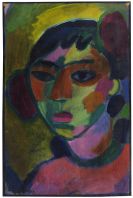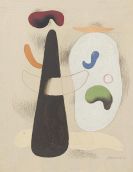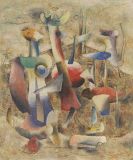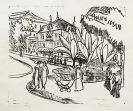
Franz Kafka
Prag
1883 -
Kierling
1924
Franz Kafka was born in Prague in 1883, the son of the Jewish businessman Hermann Kafka and his wife Julie, née Löw. From 1889 until 1893, Kafka attended the elementary school there and until 1901 attended the secondary school Altstädter Deutsches Gymnasium in the Kinsky Palace in Prague.
He studied German literature and law at the German University in Prague until 1906. There Kafka met Max Brod, who would later become his editor of his works. Kafka's early interest in literature and philosophy was experienced between the tensions of a seemingly all powerful father and his Jewish origins.
In the winter of 1904/1905, Kafka's first literary work, "Description of a Struggle" ("Beschreibung eines Kampfes"), appeared; he destroyed all his earlier literary experiments himself.
In 1906 Franz Kafka finished his studies with the title Juris Doctor and in 1907 took a position at a private insurance company. At this time, Kafka began work on the novel fragment "Wedding Preparations in the Country" ("Hochzeitsvorbereitungen auf dem Lande").
In 1909, he published eight prose pieces in the journal "Hyperion" and took a position at the Workers' Accident Insurance Institute, where he worked until his retirement in 1922.
Kafka began his diary sketches in 1910, though they were never meant for the public. At this same time, his interest was awakened to Judaism and Zionism through his friendship with the Yiddish language actor Jizchak Löwy.
In 1912, Kafka began his novel "Amerika" ("The Lost"; "Die Verschollenen") and published his first book, "Reflections" ("Betrachtungen"), a collection containing 18 of his prose pieces, and met Felice Bauer from Berlin, with whom he exchanged letters for a time. At the public reading of his text "The Judgment" ("Das Urteil") in 1912, Kafka established the style of presentation which would later be termed "kafkaesque." At this time, he began his main work "The Trial" ("Der Prozeß"), which would remain a fragment, as did "The Castle" ("Das Schloß").
In 1914, Carl Sternheim denied acceptance of the Fontane Prize but passed it on to Franz Kafka. Also in this year, Kafka published "The Metamorphosis" ("Die Verwandlung"). On account of the condition of his health, Kafka could seldom work at the insurance company. Nonetheless he continued his literary work and wrote "In the Penal Colony" ("In der Strafkolonie"), "Letter to Father" ("Brief an den Vater"), and "A Country Doctor" ("Ein Landarzt"), among other parabolic stories.
In 1922, Franz Kafka was finally sent into retirement. Despite his ill health, he began his next novel fragment "The Castle" ("Das Schloß"). In 1923, Kafka began living with the 25 year old Dora Diamant, who was educated in the Jewish tradition. His interest in Judaism increased and he began learning Hebrew. Kafka returned to Prague in 1924 and there wrote his last work "Josephine the Singer, or The Mouse Folk" ("Josefine, die Sängerin, oder Das Volk der Mäuse").
After being diagnosed with tuberculosis of the larynx, he spent his last days in the Kierling Sanatorium in Vienna. Franz Kafka died there in 1924. Although Franz Kafka requested that his literary remains be burned unread, his friend Max Brod posthumously published the novel "The Trial" in 1925 and later "The Castle" and "Amerika," along with other fragments, letters and diaries of Kafka.
Would you like to sell a work by Franz Kafka?
Infos for seller








